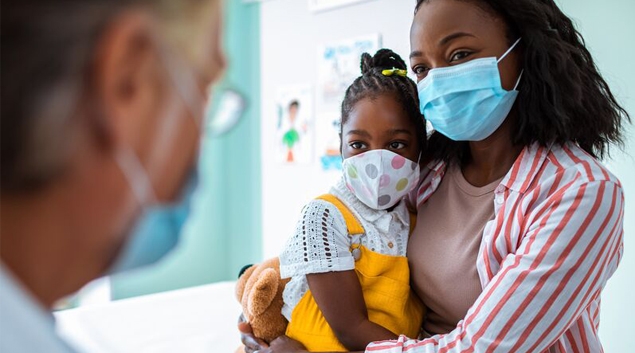Black and Hispanic patients experiencing insults in healthcare settings

Photo: Marko Geber/Getty Images
Racism and discrimination are unfortunately still common experiences in many settings, including healthcare. A new KFF survey shows that many Hispanic, Black, Asian, and American Indian and Alaska Native adults in the U.S. believe they must modify both their mindset and the way they look to stave off potential mistreatment during healthcare visits.
KFF’s 2023 Survey on Racism, Discrimination and Health, the first in a series, also documents the association of racism and discrimination with worse health and wellbeing, including heightened tendencies toward feeling anxious, lonely or depressed.
The large, nationally representative survey finds that among those who used healthcare in the past three years, 60% of Black adults, about half of American Indian and Alaska Native (52%) and Hispanic (51%) adults, and 42% of Asian adults say they prepare for possible insults from providers or staff, and/or feel they must be very careful about their appearance to be treated fairly during healthcare visits at least some of the time. One-third of white adults report doing these things.
Such preparations, behaviors documented in other research arenas as “heightened vigilance,” likely are a response to past experience, the survey suggests. A third of adults overall report at least one of several negative experiences with a health care provider in the past three years, and many Black, Hispanic, Asian, and American Indian and Alaska Native adults say they were treated this way because of their race or ethnicity.
The negative experiences asked about in the survey include a provider assuming something about them without asking, suggesting they were personally to blame for a health problem, ignoring a direct request or question, or refusing to prescribe pain medication they thought they needed.
About a quarter of Black adults and one in five American Indian and Alaska Native adults say they experienced at least one of these, and that their race or ethnicity was a reason why they were treated this way, as do 15% of Hispanic adults and 11% of Asian adults, compared with just 4% of white adults.
For example, 22% of Black adults who were pregnant or gave birth in the past 10 years say they were refused pain medication they thought they needed, roughly twice the share of white adults with a pregnancy or birth experience (10%).
Having a shared racial and ethnic background between provider and patient often is associated with more positive interactions, the survey found.
WHAT’S THE IMPACT?
The survey reveals that at least half of American Indian and Alaska Native (58%), Black (54%), and Hispanic adults (50%), and about four in 10 Asian adults (42%) say they have experienced at least one type of discrimination in daily life at least a few times in the past year. These experiences include receiving poorer service than others at restaurants or stores, people acting as if they are afraid of them or as if they aren’t smart, being threatened or harassed, or being criticized for speaking a language other than English.
Black, Hispanic, American Indian and Alaska Native, and Asian adults are more likely to attribute these experiences to their race or ethnicity compared to their white counterparts.
Among Black adults, those with self-reported darker skin tones report more discrimination. Black adults who say their skin color is “very dark,” “dark,” (62%) or “medium” (55%) are more likely to report an experience with discrimination than Black adults who say their skin color is “very light” or “light” (42%).
Specific discrimination experiences also vary by gender, with Black men being the most likely to say people act as if they are afraid of them (27%) and Hispanic women most likely to say they are treated as if they are not smart (37%).
The survey suggests that experiences with racism and discrimination contribute to, or are associated with, reported worse health and wellbeing. People who experienced discrimination in their everyday lives at least a few times in the past year are more than twice as likely as those who report rarely or never experiencing discrimination to say that in the past year, they “always” or “often” felt anxious (40% vs. 14%), lonely (26% vs. 7%), or depressed (25% vs. 7%).
These patterns are similar across racial and ethnic groups, and persist even after accounting for other demographic characteristics.
THE LARGER TREND
The survey finds that Black, Hispanic and Asian adults who have more healthcare visits with providers who share their racial and ethnic background report more frequent positive and respectful interactions.
For example, Black adults who had at least half of recent visits with a provider who shares their background are more likely than those who have fewer of these visits to say that their doctor: explained things in a way they could understand (90% vs. 85%), involved them in decision-making about their care (84% vs. 73%), understood or respected their cultural values or beliefs (84% vs. 76%), or asked them about their work, housing, or access to food or transportation (39% vs. 24%) during recent visits.
However, reflecting limited racial and ethnic diversity of the healthcare workforce, at least half of Black (62%), Hispanic (56%), AIAN (56%) and Asian (53%) adults who used healthcare in the past three years say that fewer than half of their visits were with a provider who shared their racial and ethnic background. In contrast, about three-quarters (73%) of white adults say that half or more of their visits were with a provider who shares their racial and ethnic background.
Twitter: @JELagasse
Email the writer: Jeff.Lagasse@himssmedia.com
Source link



